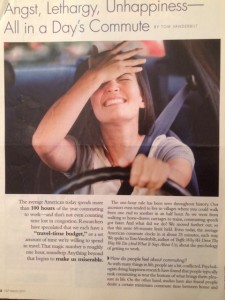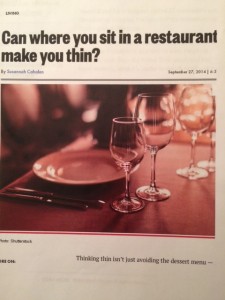Over the years I have collected articles and studies that I believe are relevant to one’s well-being and health, and I will occasionally be referring to same in my blog as references. One such article appeared in the AAA’s monthly magazine, Car & Travel, the May 2011 edition, entitled “Angst, Lethargy, Unhappiness – All in a Day’s Commute”, by Tom Vanderbilt. That article discussed that the most time we can tolerate commuting to work (round trip) is around one hour a day (without traffic), and that beyond that time, the commute starts to make us miserable. For me, my commute to work, for many years, was over 2 hours daily, without traffic, but now with telecommuting, I can now cut down on the days I am subjected to drudgery of commuting . The article suggests that if you want to feel happier, lessen the duration of your commute as much as possible, and definitely below an hour.
There are also studies (I will find them later), that show that the longer the commute, the more weight we tend to gain since we are more apt to eat in the car during our commute, and what we eat, tends to be the junk variety. To counteract that tendency, I employ a few strategies: (i) I do not eat in my car commuting to or from work, and will wait to eat breakfast at work, (ii) I have unsweetened ice tea in my car, which I drink to work, and have water on my return home (I never have any soda, sweetened drinks like Gatorade, fruit juices, etc., even if they are the diet variety), (iii) before leaving work I sometimes have some peanut butter or nuts as a snack to hold my appetite in check, and (iv) I carry a mint spray in my car in case I need a little fresh taste in my mouth. All these strategies have helped keep me from eating during my commute. Another strategy, which I will discuss in greater detail in future blogs, is that I have set in place a system wherein dinner only takes 15 minutes to prepare, so that is the first thing I do when I get home, and helps me to better deal with the sense of hunger caused by commuting.
The other article I wanted to share, is a NY Post article, from September 27, 2014, entitled “Can Where You Sit in a Restaurant Make You Thin?” by Susannah Cahalan. In that article, she refers to the finding in a book from a Cornell Professor, Brian Wansink, entitled “Slim By Design”. Professor Wansink’s findings are that people eat healthier if they sit by the window, or in well-lit areas, where they might be more conscious of people watching them eat and what they are eating. He also found that people eat less healthy at tables further from the front door, in darkly lit areas of the restaurant, or in booths, presumably where less people can see what they are eating and watch them eat. He also suggested staying away from buffets, which I also believe in, since one tends to overeat when things are plentiful. Particularly at breakfast, I always try to order off the menu, rather that get the buffet, but that is not always possible. So here are some tips: (i) use smaller plates, (ii) decide ahead to time exactly what you are going to get, and what portion size, (iii) get all your food at once, which will take away the temptation for seconds, (iv) stay away from bagels or white bread, so if you want bread only get whole wheat or multigrain slices, and make sure they are toasted, (v) stay away from fruit juices, as they contain lots of sugar, and instead get fresh fruit, making sure to drain any liquid they are contained in (but if you want fruit juice, then dilute it with water, particularly, sparking water), and (v) have lots of water with your meal to fill you up.
Hopefully these articles and tips will help you not to gain weight from your commute, and provide you with some helpful guidance when dining out.


